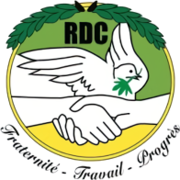Central African Democratic Rally
Central African Democratic Rally Rassemblement Démocratique Centrafricain | |
|---|---|
 | |
| Founder | André Kolingba |
| Founded | 6 February 1987 |
| Headquarters | Bangui |
| Ideology | African nationalism Democratic socialism[citation needed] Social democracy[citation needed] Republicanism[citation needed] |
| Political position | Centre-left[citation needed] to left-wing[citation needed] |
| Colors | Yellow |
| Seats in the National Assembly | 4 / 100 |
| Website | |
| http://le-rdc.over-blog.com/ | |
The Central African Democratic Rally (French: Rassemblement Démocratique Centrafricain, RDC) is a political party in the Central African Republic.
History
[edit]The party was established on 6 February 1987,[1] initially as the political vehicle for President André Kolingba. It was the only legal party in the country until 1992.
Kolingba was the party's presidential candidate in the 1993 general elections, and was eliminated in the first round after receiving just 12% of the vote. The party won 13 seats in the National Assembly, emerging as the second-largest faction behind the Movement for the Liberation of the Central African People (MLPC). It subsequently joined the coalition government led by the MLPC's Jean-Luc Mandaba.[2]
In the next parliamentary elections in 1998 the RDC was part of the Union of Forces for Peace, (UFAP) which opposed President Ange-Félix Patassé. The RDC won 20 seats, and UFAP gained a majority of 55 of the 109 seats in the National Assembly. However, the MLPC was able to form a government after the defection of a UFAP MP.[3] Kolingba was the party's candidate for the 1999 presidential elections, finishing second with 19% of the vote as Patassé was elected in the first round of voting.
Kolingba was the party's presidential candidate again for the 2005 general elections. He finished in third place with took 16% of the vote.[4][5] The elections also saw the party reduced to seven seats in the National Assembly.[5]
In the 2011 general elections the party won just one seat in the National Assembly, whilst its presidential candidate Émile Gros Raymond Nakombo finished fourth in a field of five with 5% of the vote.
After the death of André Kolingba, the party was chaired by his son Désiré Kolingba, until his death in April 2021.
References
[edit]- ^ CAR: Parties with seats in the 2005 National Assembly Archived April 2, 2015, at the Wayback Machine EISA
- ^ Elections held in 1993 IPU
- ^ Tom Lansford (2014) Political Handbook of the World 2014, CQ Press, p249
- ^ Report of the Observation Mission of the Presidential and Legislative Elections of 13 March and 8 May 2005 in the Central African Republic Archived 22 June 2007 at the Wayback Machine Francophone Democracy (in French)
- ^ a b Elections in the Central African Republic African Elections Database
- 1987 establishments in the Central African Republic
- African and Black nationalist parties in Africa
- Democratic socialist parties in Africa
- Parties of one-party systems
- Political parties in the Central African Republic
- Political parties established in 1987
- Social democratic parties in Africa
- Socialism in the Central African Republic
